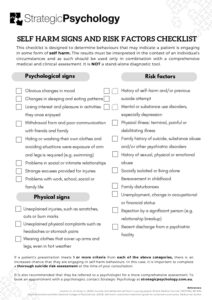
SELF-HARM-SIGNS-AND-RISK-FACTORS-CHECKLIST
478 KB
This checklist is designed to determine behaviours that may indicate a patient is engaging in some form of self harm. The results must be interpreted in the context of an individual’s circumstances and as such should be used only in combination with a comprehensive medical and clinical assessment. It is NOT a stand-alone diagnostic tool.
This checklist is designed to determine behaviours that may indicate a patient is engaging in some form of self harm. The results must be interpreted in the context of an individual’s circumstances and as such should be used only in combination with a comprehensive medical and clinical assessment. It is NOT a stand-alone diagnostic tool.
Psychological sign
Obvious changes in mood
Changes in sleeping and eating patterns
Losing interest and pleasure in activities they once enjoyed
Withdrawal from and poor communication with friends and family
Hiding or washing their own clothes and avoiding situations were exposure of arm and legs is required (e.g. swimming)
Problems in social or intimate relationships
Strange excuses provided for injuries
Problems with work, school, social or family life
Risk factors
History of self-harm and/or previous suicide attempt
Mental or substance use disorders, especially depression
Physical illness: terminal, painful or debilitating illness
Family history of suicide, substance abuse and/or other psychiatric disorders
History of sexual, physical or emotional abuse
Socially isolated or living alone
Bereavement in childhood
Family disturbances
Unemployment, change in occupational or financial status
Rejection by a significant person (e.g. relationship breakup)
Recent discharge from a psychiatric facility
Physical signs
Unexplained injuries, such as scratches, cuts or burn marks
Unexplained physical complaints such as headaches or stomach pains
Wearing clothes that cover up arms and legs, even in hot weather
If a patient’s presentation meets 1 or more criteria from each of the above categories, there is an increased chance that they are engaging in self-harm behaviours. In this case, it is important to complete a thorough suicide risk assessment at the time of your consultation.
It is also recommended that they be referred to a psychologist for a more comprehensive assessment. To book an appointment with a psychologist, contact Strategic Psychology on (02) 6262 6157 or email support@strategicpsychology.com.au.
Reference: American Psychiatric Association. (2013). Diagnostic and statistical manual of mental disorders (DSM-5). Washington, D.C.: American Psychiatric Association.
